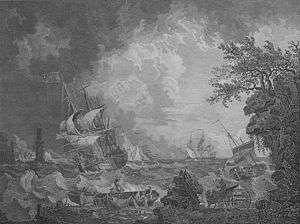HMS Neptune (1757)
For other ships with the same name, see HMS Neptune.
 | |
| History | |
|---|---|
| Name: | HMS Neptune |
| Ordered: | 12 July 1750 |
| Builder: | Portsmouth Dockyard |
| Launched: | 17 July 1757 |
| Fate: | Broken up, 1816 |
| General characteristics [1] | |
| Class and type: | 1750 amendments 90-gun second rate ship of the line |
| Tons burthen: | 1,798 long tons (1,826.9 t) |
| Length: | 171 ft (52.1 m) (gundeck) |
| Beam: | 48 ft 6 in (14.8 m) |
| Depth of hold: | 20 ft 6 in (6.2 m) |
| Propulsion: | Sails |
| Sail plan: | Full rigged ship |
| Armament: |
|
HMS Neptune was a 90-gun second rate ship of the line of the Royal Navy, built at Portsmouth Dockyard to the draught specified by the 1745 Establishment as amended in 1750, and launched on 17 July 1757.[1]
The Neptune was the flagship for Vice-Admiral Charles Knowles in 1757.[2] One of Neptune's midshipmen at this time was John Hunter, later to become an admiral and the second Governor of New South Wales.[2]
Neptune was converted to serve as a sheer hulk in 1784, and continued in this role until she was broken up in 1816.[1]
Neptune has been identified as the subject of a 1764 prize-winning painting by Liverpool marine artist Richard Wright, subsequently engraved by William Woollett entitled The Fishery.[3]
Notes
- 1 2 3 Lavery, Ships of the Line vol.1, p174.
- 1 2 Auchmuty, J.J. (1966). "Hunter, John (1737-1821)". Australian Dictionary of Biography Online. Melbourne University Press. Retrieved 13 January 2009.
- ↑ "Background information". Walker Art Gallery. Retrieved 25 June 2015.
References
- Lavery, Brian (2003) The Ship of the Line - Volume 1: The development of the battlefleet 1650-1850. Conway Maritime Press. ISBN 0-85177-252-8.
This article is issued from Wikipedia - version of the 10/13/2015. The text is available under the Creative Commons Attribution/Share Alike but additional terms may apply for the media files.